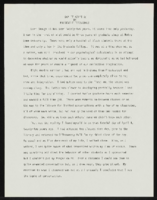Search the Special Collections and Archives Portal
Search Results
Beth Duncombe oral history interview
Identifier
Abstract
Oral history interview with Beth Duncombe conducted by Jennifer Kalas on December 12, 2004 for the Public School Principalship Oral History Project. In this interview, Duncombe reflects upon her 30-year career as a teacher and administrator in Las Vegas, Nevada. She describes the process by which she became a special education teacher, and life experiences that she feels best prepared her for the principalship, such as teaching in England and working in both public and private education. She also discusses her approach to school administration, and her efforts in creating certain learning environments.
Archival Collection

"Say It Ain't So": article draft by Roosevelt Fitzgerald
Date
Archival Collection
Description
From the Roosevelt Fitzgerald Professional Papers (MS-01082) -- Drafts for the Las Vegas Sentinel Voice file. On the death of Martin Luther King, Jr. on the author's birthday.
Text
University of Nevada, Las Vegas Office of the Vice President for Research Records
Identifier
Abstract
The University of Nevada, Las Vegas (UNLV) Office of the Vice President for Research Records (1990-1992) mainly contains researcher grant proposal files kept by Dr. David McNelis who was the Associate Vice President for Research at UNLV from 1990 to 1994. Materials include applications, reports, and correspondence related to the Cray Research, Inc. and National Supercomputing Center for Energy and the Environment as well as applications for various UNLV research support grants. Nomination letters and applications for the first annual Nevada Regents' Researcher Award are also included in this collection. The collection also includes correspondence, reports, and research materials from UNLV's Academic Master Planning committee which was tasked with developing a long range development plan for the university in the early 1990s.
Archival Collection
M. Joy Leavitt oral history interview
Identifier
Abstract
Oral history interview with M. Joy Leavitt conducted by Matthew Jackson on March 09, 2004 for the Public School Principalship Oral History Project. In this interview, Leavitt reflects upon her 33-year career as an elementary school teacher and administrator with Nevada’s Clark County School District from the 1970s to the 2000s. She discusses her experience as a teacher and principal, her approach to school administration, and challenges that she faced such as being a principal at the time of the September 11, 2001 terrorist attacks. She also discusses some of her best experiences while being principal and the environments of different schools.
Archival Collection

Stavan Corbett oral history interview: transcript
Date
Archival Collection
Description
Oral history interview with Stavan Corbett conducted by Nathalie Martinez on November 5, 2018 for the Latinx Voices of Southern Nevada Oral History Project. Barbara Tabach and Rodrigo Vazquez also participate in the questioning. Stavan Corbett is a member of the Latino community who has served as an educator and politician in Las Vegas. Growing up in Las Vegas, Stavan was exposed to various environments that all helped him shape his Latino identity. Stavan was able to appreciate the Catholic and Jewish cultures as well. During the 1970s and '80s his experiences with first and second generation Latinos played a large role in his identity formation, especially as a student. He was the first in his family to graduate from high school and college. Stavan worked in the hotel industry and moved on to work with troubled youth and eventually become a member of the Nevada State Board and the Clark County School Board. His continued work with the Latin Chamber of Commerce has also allowed him to be involved with the Latino Youth Leadership Conference. Subjects discussed include: Identity Struggle, Interracial Relationships, Working in the Hotel Industry, Clark County School District, and Cultural Assimilation.
Text
Mary Ann and Carl Merrill oral history interview
Identifier
Abstract
Oral history interview with Mary Ann and Carl Merrill conducted by Dennis McBride on June 24, 1986 for the Boulder City Library Oral History Project. In this interview, Carl Merrill discusses working for Anderson Brothers Dairy at the dam construction site and his experiences as a worker and resident in Boulder City, Nevada. Mary Ann Merrill talks about moving with her parents and brother to Boulder City and finding work, as a teenager, in the town. They both discuss their marriage and subsequent life in Boulder City, commenting on the environment, social conditions, and growth in Southern Nevada.
Archival Collection
Richard D. Chase oral history interview
Identifier
Abstract
Oral history interview with Richard D. Chase conducted by Helen Rondthaler on October 17, 1972 for the Ralph Roske Oral History Project on Early Las Vegas. Chase discusses the history of Las Vegas, Nevada from 1945, touching on topics such as the housing shortage during the 1940s, The Red Rooster swingers’ club, Billy Moore, Sam Larson, Ira Goldring, atomic bomb testing, and the Nevada environment. Chase discusses the importance of construction-based labor to the development of Southern Nevada. Chase also explains at length the impact of the Nevada Test Site on his construction company.
Archival Collection
Alberta Shearin oral history interview
Identifier
Abstract
Oral history interview with Alberta Shearin conducted by Deanne Lahr on March 12, 1981 for the Ralph Roske Oral History Project on Early Las Vegas. In this interview, Shearin discusses moving to Las Vegas, Nevada after her husband was stationed at Nellis Air Force Base in 1943. Shearin describes Las Vegas during World War II and how it has changed, chemical plants in Henderson, Nevada and their effects on the environment, and what her and her family did for recreation. Shearin also discusses the local school system and racial integration in schools and neighborhoods, as well as natural disasters that have occurred in the city.
Archival Collection
Bernie and Barbara Kaufman oral history interview
Identifier
Abstract
Oral history interview with Bernard and Barbara Kaufman conducted by Barbara Tabach on October 27, 2014 for the Southern Nevada Jewish Heritage Project. In this interview, the Kaufmans reflect upon their upbringing in St. Louis, Missouri, where they met and married, and making the decision to move to Las Vegas, Nevada. They discuss the experience of running their stores and the impact on business as the retail environment changed over the years. The Kaufmans also talk about their involvement with the Jewish community, including B’nai B’rith and Sisterhood, and how it has grown over the years. They also discuss the impact of the Jewish community members in gaming as well as other sectors, and the increase of congregations over the decades.
Archival Collection

Interview with Bruce Walter Church, April 27, 2004
Date
Archival Collection
Description
Access note: May not quote in any form without written permission from interviewee
Text
